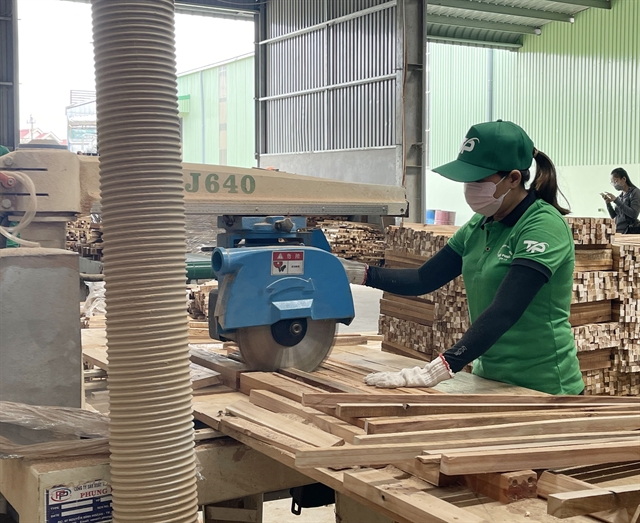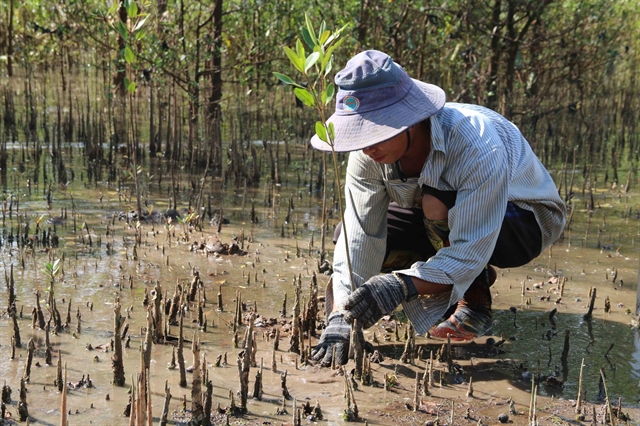 Economy
Economy


|
| A worker cuts wood at a factory in Cam Lộ District, Quảng Trị Province. Vietnamese enterprises must give special attention to sustainability with the focus on ensuring timber legality to expand exports to the UK. — VNA/VNS Photo |
HÀ NỘI — The UK – Việt Nam Free Trade Agreement (UKVFTA) was providing a significant push moving the timber industry towards sustainability – a vital factor for the industry to be able to take advantage of opportunities from the trade deal to expand exports to this selective market.
Ngô Sỹ Hoài, Deputy Chairman cum General Secretary of the Việt Nam Timber and Forest Products Association (VIFORES), said the UKVFTA which took effect in May 2021 helped Việt Nam maintain and increase exports to the UK, despite Brexit in January 2020.
The UK was an important export market of Việt Nam’s wooden products in Europe, accounting for around 30-40 per cent of Việt Nam’s export value to the EU.
VIFORES’ statistics showed that Việt Nam’s exports of timber and wooden products to the UK rose by more than 18 per cent to reach US$256 million in 2021. Notably, around 92 per cent of wooden products exported to the UK were valuable woodwork and furniture.
However, Việt Nam’s exports to the UK saw a drop of 8.5 per cent to $232.96 million in 2022 due to falling consumption demand in the UK, an impact of the economic slowdown and high inflationary pressure. The drop continues this year and British consumers tightened spending.
Statistics of the International Trade Centre showed the UK’s import of wood products fell by 27.3 per cent to $2.1 billion in January-June. The UK’s import of wooden products from Việt Nam accounted for 5.7 per cent of the total import value in the first half of this year.
Hoài forecast that Việt Nam would earn around $230 million from exporting wood and forest products to the UK this year, or around 1,4 per cent of Việt Nam’s total timber and wood products, citing statistics that the export value in January-September was estimated at $170 million.
According to the Import-Export Department under the Ministry of Industry and Trade, the presence of Việt Nam’s wood products in the UK remained modest.
In 2018-2022, the UK imported on average $4.3 billion worth of wooden products each year, of which Việt Nam accounted for around 8 per cent.
There was still significant space to increase the market share of Việt Nam’s wooden products in the UK as the UKVFTA, coupled with the Comprehensive and Progressive Trans-Pacific Partnership (CPTPP) with the UK becoming a new member, was paving the way for these products with preferential tariffs, the department said.
Hoài said that under the UKVFTA, the tariffs would be lifted for wooden products in five years, offering a competitive advantage for Việt Nam.
Go sustainable

|
| A farmer is planting trees in Cầu Ngang District, Trà Vinh Province. The UKVFTA is creating huge opportunities for the Vietnamese wood processing industry to grow sustainably. — VNA/VNS Photo |
Success in the UK, a highly demanding market with a long-standing and developed wood processing industry, would create an accelerator for Việt Nam to expand to other markets, Hoài said.
“To increase exports to the UK, Vietnamese enterprises have to attach special attention to going sustainable with the focus on ensuring timber legality,” he stressed, adding that the UK, both when it was a member of the EU and after Brexit, always raised the flag for combating climate change and promoting green growth.
Hoài pointed out that the UK Government had set a series of strict environmental requirements such as greenhouse gas emissions, green production, green trade, green economy, legal timber exploitation, sustainable forest management and biodiversity conservation, urging the wood industry of Việt Nam to make a dramatic transition towards sustainability.
Hoài proposed the Government consider negotiating and signing with the UK an agreement similar to the Voluntary Partnership Agreement on Forest Law Enforcement, Governance and Trade with the EU (VPA/FLEGT). After the Brexit, the VPA/FLEGT was no longer applicable with the UK.
A similar agreement with the UK would encourage Vietnamese wood businesses to increase investments, Hoài said, adding that Indonesia already signed the agreement with the UK.
According to Trần Sĩ Chương, a member of London-based strategy consulting firm 3Horizons, the resonance of the recent global negative fluctuations caused the world to operate in a completely new way with new rules emerging, forcing players to promptly make changes to adapt.
For the wood industry, the new rule was the increasing requirement for sustainability. “Sustainability is no longer voluntary but becoming mandatory for market participation and expansion,” he said. “Green transition is the way to improve competitiveness.”
Sharpening competitiveness
According to Hoài, the wood industry of Việt Nam must focus on building brands based on the development of transparent and sustainable value chains.
Tariff liberalization was not the only advantage provided by the UKVFTA, he said, adding that a more comprehensive advantage was the ability of businesses to connect with foreign-invested enterprises, especially those from the UK, to establish supply chains.
Hoài pointed out that currently Việt Nam mainly produced to fulfil outsourcing contracts and did not pay adequate attention to designing and promoting brands, thus, the added value remained modest.
The focus must be on improving product quality and design based on the market demand and tastes to increase added value, Hoài said.
It was vital for the industry to enhance trade promotion and brand development, Hoài said, adding that enterprises should also be well aware of intellectual property protection in foreign markets, including the UK, to avoid risks.
A publication about the impact of UKVFTA on sustainable development of Việt Nam’s wood industry on the website of the Centre for International Forestry Research (CIFOR) pointed out that the UKVFTA was creating huge opportunities for the Vietnamese wood processing industry to grow sustainably.
To help Vietnamese enterprises realise the advantages from the UKVFTA, the Vietnamese Government should develop policies to encourage investment in renovating technologies in line with global demand, developing brand building strategy to the UK market and providing clear instructions to implement the trade deal.
Improving enforcement of other policies such as VPA/FLEGT, promoting the expansion of certified forest and sustainable forest development would further facilitate the implementation of UKVFTA. — VNS